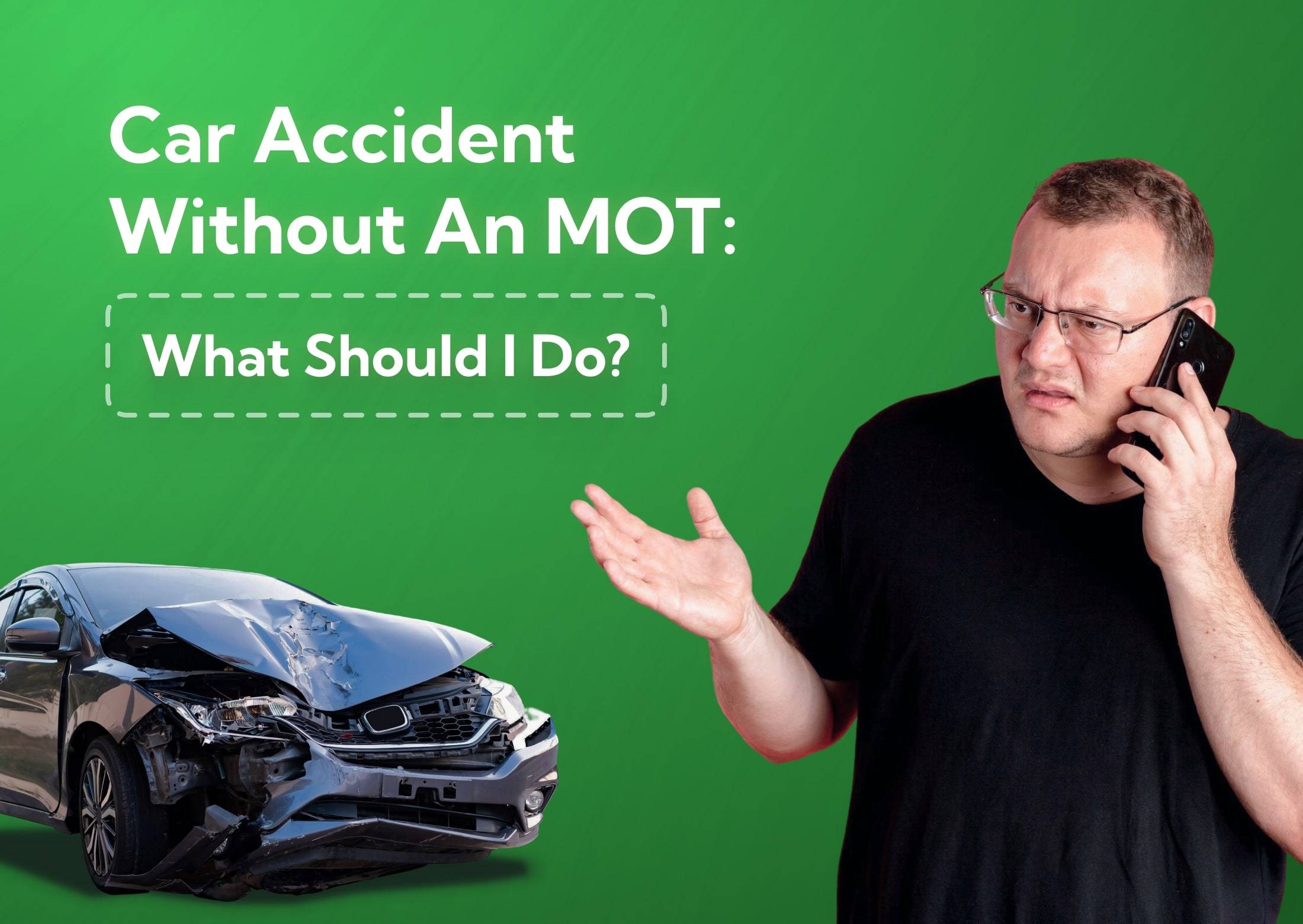What Happens If I Have a Car Accident Without an MOT?
Learn what steps to take, potential repercussions, and how to handle them if you’re involved in a car accident without a valid MOT in the UK.
Last updated: 23rd October, 2025

Anthony Sharkey is COO at New Reg Limited (Car.co.uk, Trader.co.uk, Garage.co.uk), driving innovation in vehicle recycling, logistics, and customer experience.

Listen to this story
Getting into a car accident is a jarring experience, especially if it's a serious one. While the immediate safety of you and those around you is first priority, there will be other concerns when dealing with the aftermath of the accident. If you have a car accident without an MOT, you'll face serious consequences that extend far beyond the crash itself. Your insurance will likely be invalidated, leaving you personally liable for all damages – even if you weren't at fault. You could face fines up to £2,500, and in severe cases, your vehicle may be impounded.
The moment you drive without a valid MOT certificate, you're breaking UK law. Once your car is over three years old, you must have an annual MOT test to prove it meets minimum safety and environmental standards. This isn't just a legal box to tick – it's your responsibility as a motorist to ensure your vehicle is roadworthy and won't endanger others.
When your MOT expires, you can only legally drive to a pre-booked MOT test or repair appointment. If you're caught in any other situation – including an accident – the legal and financial repercussions can be devastating. Your insurance company will almost certainly void your policy, meaning you'll have to cover all repair costs, medical bills, and legal fees out of your own pocket, regardless of who caused the accident.
What's in this article
- 1. Legal consequences of driving without an MOT
- 2. How does not having a valid MOT affect your liability in an accident?
- 3. What fines might I face for getting in an accident without a valid MOT?
- 4. Legal defences against driving without an MOT
- 5. Steps to take immediately after a car accident without an MOT
- 6. Handling accident repairs for a car without an MOT
- 7. How can I check the validity of my MOT certificate?
- 8. Can I renew my MOT after an accident?
- 9. Can driving without an MOT affect my future insurance premiums?
- 10. Can I drive my car to a garage for repairs if it doesn't have an MOT?
- 11. The bottom line: driving without an MOT is a tremendous risk!
Legal consequences of driving without an MOT
Under Section 47(1) of the Road Traffic Act 1988, it's illegal to drive, or allow to be driven, a vehicle that requires but does not have a valid MOT test certificate.
Here's an overview of the potential penalties and legal implications:
Fines
Most offences result in a £100 fixed penalty notice, but you can be fined up to £1,000 for driving without a valid MOT certificate. If the vehicle’s condition is deemed dangerous, the fine can increase to £2,500.
Penalty points on your licence
Although driving without an MOT in itself does not lead to penalty points, if the vehicle is found to be in a dangerous condition, you could receive points on your license.
Insurance implications
Most of the time, driving without an MOT automatically invalidates your car insurance. If this is the case with your policy, not only would you face the standard legal penalties for not having an MOT or insurance cover, but your insurer will not cover the costs for damages, leading to substantial out-of-pocket expenses.
Vehicle impoundment
In more serious cases, your vehicle could be impounded if you're caught driving without an MOT or a valid insurance policy.
How does not having a valid MOT affect your liability in an accident?
One of the most immediate impacts of not having a valid MOT is on your car insurance. Almost every insurance policy requires the car to be in a roadworthy condition, which is officially confirmed by having a valid MOT certificate.
If you are involved in an accident without a valid MOT, your insurer will most likely consider your policy invalid. When this is the case, you won't be able to make a claim for damages to your vehicle or liabilities to third parties, leaving you financially responsible for all costs.
- If you are at fault, you'll have to cover all costs for damages to the other person's vehicle, property, and any medical expenses without the support of an insurer to handle claims or legal challenges.
- If you are not at fault, you're still vulnerable to substantial financial and legal burdens, especially if you need to pursue compensation through the courts or negotiate settlements directly with the at-fault party.
In the aftermath of a serious accident that requires court proceedings, the illegality of driving without an MOT could potentially be seen as contributory negligence. In other words, you could be deemed partly at fault for the accident simply due to the lack of a valid MOT. This complicates legal proceedings and potentially increases your liability for damages.
It's essential to read the fine print of your insurance policy. You should be aware of the terms and conditions regarding MOT expiry, whether your policy will still cover you, and under which circumstances they will (e.g., at-fault vs. not at-fault).
What fines might I face for getting in an accident without a valid MOT?
If you are involved in an accident without a valid MOT, you might not directly face a fine for the accident itself.
The fines directly involved with your lack of MOT certificate include:
- £100 fixed penalty notice
- Up to £1,000 fine in court
- Up to £2,500 fine if your vehicle is deemed dangerous
- Driving without proper insurance (up to £300 fixed penalty notice, or unlimited fine in court)
Keep in mind each of these is related to the initial offence of being caught driving without a valid MOT certificate. If there are other violations, such as dangerous driving, speeding, or drink-driving, the penalties and fines can be significantly higher.
Legal defences against driving without an MOT
There are only two defenses available for driving without an MOT. You are allowed to drive your car without a valid MOT certificate if:
- You're going directly to a pre-booked MOT appointment.
- You're driving to a garage for a pre-booked repair appointment after failing the MOT test (provided the vehicle has no 'dangerous' defects).
In both cases, your insurance will not have been invalidated, you have not committed an offence, and your liability in case of an accident is unaffected. However, you must be able to prove that you were on your way to or from a pre-booked appointment at the time of the accident.
If you are unable to provide sufficient evidence of this, you will face legal penalties for driving without an MOT, effectively void your insurance, and remain liable for all damages or injuries caused in the accident.
What the experts say

Steven Jackson OBE
Steps to take immediately after a car accident without an MOT
Many of the actions to take immediately following a car accident stay the same, regardless of whether you have a valid MOT certificate or not. It's the events that follow that will differ, since you were already breaking the law by driving without an MOT (and likely a second law by driving without insurance).
1. Safety first.
Regardless of the MOT status, your first priority should be safety. Check for injuries to yourself and any passengers. If anyone is hurt, call emergency services immediately.
2. Secure the scene.
Turn on your hazard lights to indicate you're not moving. If possible, move the vehicle to a safe location, like the side of the road.
3. Exchange information.
Swap details with the other driver(s) involved, including names, contact information, vehicle registration numbers, and insurance details. Take photos of this important info so you always have it on your smartphone.
4. Call the police.
You aren't always required to report a car accident to the police, but there are specific circumstances when it becomes necessary.
You're legally required to report the accident to the police if:
- The accident results in injury to anyone involved.
- There is property damage or injury to an animal (not including your own vehicle or animal in your vehicle), and no insurance details have been exchanged at the scene.
- You hit something like another vehicle or a streetlight, and no one else was involved, but you did not leave your details (for example, by leaving a note where the owner can find it). In this instance, you must report the accident to the police within 24 hours.
Depending on the situation, it might be wise to notify the authorities anyway. They can mediate the situation and document everything with a detailed official report.
5. Document the accident.
Take pictures of the scene, the vehicles involved, and any relevant road conditions or signs. Also note important details about the accident, like the date, time, location, witnesses present, and scenario leading up to it. These will be crucial for managing other drivers' insurance claims and legal issues that might arise.
If you were on your way to a garage for a pre-booked MOT test or repair, make sure you document the exact location and route you took. This proves you were on the path from point A to point B. If you forget to document your planned route, you might not be able to argue the legality of driving without an MOT.
6. Tell your insurance provider.
Once you've addressed health and safety concerns, documented everything, and safely left the scene of the accident, call your insurance provider.
Let them know about your missing MOT and any other relevant details about the accident. They'll advise you on how to move forward with your claim, the limits of your coverage, or what your options are if you aren't covered.
7. Seek legal advice.
Given the complexities of getting into an accident without an MOT (and your potential lack of representation from your insurance provider), it's important to seek legal advice.
A solicitor who specialises in motor law will help you navigate the complicated legal proceedings and ensure you receive fair treatment in court. Plus, they can negotiate on your behalf to potentially reduce any fines or penalties.
8. Arrange an MOT check and repairs.
Of course, you'll need to take the car in if serious damage has been done to it. Regardless, use this time to get an MOT test, certify its roadworthiness, and avoid putting yourself in such a compromised situation again.
Handling accident repairs for a car without an MOT
The MOT status itself does not affect the standard process for handling repairs. But depending on the circumstances, you might end up paying for it out of pocket.
If another driver is at fault (according to insurance companies), you may be able to have their insurer pay for damages. However, the situation can become more complicated if you are determined to be partially or entirely responsible.
How can I check the validity of my MOT certificate?
The easiest way to check your car's MOT status is to use our free MOT status and history checker. All you need to do is enter your vehicle registration number, and we'll show you:
- Your vehicle's current MOT status
- The due date for its next MOT test
- A full history of any previous tests, pass or fail
- Advisory notes from your last test, if there were any
If you are unsure of your car's current status, the best thing you can do is check right now. If you're in an accident, neither your insurer not legal entities will care whether you were aware that your MOT had expired or not.
Can I renew my MOT after an accident?
Yes, you can renew your MOT after an accident. If you do not have a valid one before the accident took place, you 100% should get one afterward.
That said, there are a few considerations to keep in mind:
- Serious damages: If the accident caused damage that affects safety features or critical mechanical systems (like brakes, lights, steering, or structural integrity), you must address these repairs before anything.
- General vehicle condition: Even if there is no extreme damage, there may still be problems the accident caused that will result in a failed MOT test — for example, if a fender bender misaligned your headlamps or crushed your windshield.
- Documentation: If there were accident-related damages, it might be helpful to have documentation from the repairs to show what was fixed. This can be useful during the MOT test, especially if there were significant repairs that might affect the vehicle's systems or safety features.
Prepping for an MOT test? Use our MOT checklist to ensure you tick all the boxes.
Can driving without an MOT affect my future insurance premiums?
If you're found driving without an MOT, it tells insurers your car has potentially not been maintained to its required safety and environmental standards. To them, this increases the risk of an accident or failure, which is something they'll consider when calculating your premiums.
If you are involved in an accident, your insurance will generally go up either way. If it takes place while your vehicle doesn't have a valid MOT, it will likely increase even more.
Can I drive my car to a garage for repairs if it doesn't have an MOT?
You can legally drive your car to a garage for repairs even if it doesn't have a valid MOT, but only under specific conditions. You are allowed to drive your car to a pre-booked MOT test or to a garage for repairs necessary to pass an MOT test.
Here are the important points to consider:
- You must have a pre-booked appointment with the garage or MOT test centre.
- You have to be able to prove the appointment if stopped by the police (e.g., via a booking confirmation).
- You should take the most direct route to the garage. Any significant deviation from this route can be considered an offence.
- Although you can drive to get the MOT issues fixed, your vehicle must still be safe to drive (no 'dangerous' defects).
The bottom line: driving without an MOT is a tremendous risk!
Knowing your car's MOT status is part of being a responsible vehicle owner.
You wouldn't risk driving with a flat tyre, balding brakes, or any other safety issue, would you? So why take your chances with not having an MOT?
Not having an MOT has consequences that extend far beyond a slap on the wrist. You'll face problems with:
- Fines
- Points on your licence
- Greater costs and liability in the event of an accident
- Higher insurance premiums
- Potentially increased safety risks for yourself, passengers, and other road users
- Problems when getting your car ready for sale
If you've recently been in an accident, use the steps in this guide to navigate the process and help you get back on the road safely and legally.
About Car.co.uk

Share on
Latest news & blogs










